Key Takeaways:
- Growing Demand: There’s a growing need for mental health counselors due to rising mental health issues.
- Degree Requirements: Most mental health counseling positions require at least a master’s degree and state licensure.
- Diverse Roles: Counselors work in various settings like schools, clinics, and private practices.
- Educational Path: Counseling degrees cover extensive coursework and internships and often lead to specialization.
- The degree counselors need to secure meaningful work as mental health counselors depends on each state’s job description, employer, and requirements.
“All therapists have the inherent drive to reach in and help turn on the shining brilliance of each person with whom we work..” — Lisa Ruth Mitchell
Listening with focus and empathy is incredibly simple yet incredibly powerful. It is also something that few people can do. Those who have the capacity for profoundly tuning into the spoken and unspoken words of others, and responding with wisdom and compassion, have the potential to do deeply meaningful counseling work.
A Career in Counseling
A career in counseling is secure and meaningful work. As a mental health counselor, you can directly improve and even save people’s lives. Mental Health America’s State of Mental Health in America Report reveals that over 10 million adults report unmet mental health treatment needs. Among those under 18, only 28.2% of youth experiencing a severe Major Depressive Episode receives consistent treatment.
Mental health counselors are on the front lines of intervention for widespread and severe issues, such as substance use and behavior disorders. These challenging but rewarding counseling jobs are already in high demand, and the number of open positions is only expected to grow in the coming years.
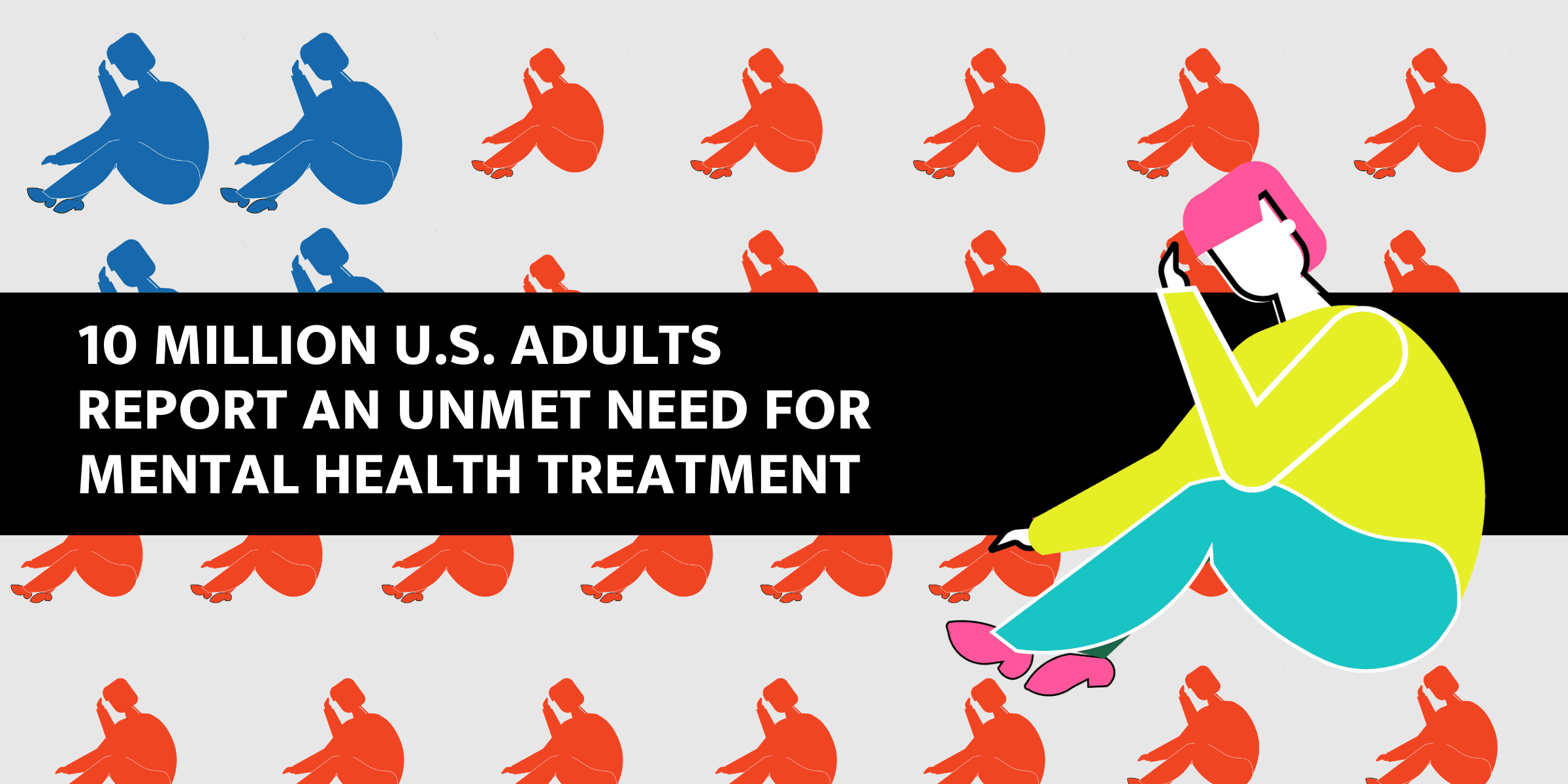
Our guide to What Can I Do with a Counseling Degree? can help you understand what forms counseling can take, how counseling programs work, and the broad range of job prospects with a counseling degree.
Jump To:
- What is Counseling?
- What Types of Counselors Are There?
- What is a Degree in Counseling?
- What Classes Will I take for a Degree in Counseling?
- What Counseling Credentials Will I Need?
- What Jobs Can I Get with a Degree in Counseling?
- What is the Job Market with a Degree in Counseling?
- What are the Pros and Cons of a Degree in Counseling?
What is a Mental Health Counselor?
Counselors are clinical professionals who evaluate and treat mental health problems. Counseling work can take the form of advising clients, providing psychoeducation, teaching coping skills, and challenging problematic behaviors or thought patterns.
Sometimes this takes the form of one-on-one counseling, but group sessions are also very common, particularly in institutional settings such as schools, prisons, and addiction treatment centers. As part of their duties, counselors maintain required documentation of treatment, assess patient status and needs, and design and implement treatment plans.
Mental health counselors usually work in clinical settings as part of a treatment team, including a psychiatrist and social worker, to coordinate care. As a team, these clinicians will make referrals and treatment recommendations. Many counselors serve as case managers. With experience, it’s also possible for counselors to work independently in private practice.
Some of the most common roles for mental health and licensed professional counselors are:
- Marriage and Family Counselor / Marriage and Family Therapists
- Guidance Counselor
- Rehabilitation Counselor
- Counseling Psychologist
- School Counselor
- Substance Abuse Counselor / Substance Abuse Counseling
What is the Difference Between a Counselor and a Psychologist?
Many prospective counseling professionals and mental health consumers are confused about the difference between a counselor and a psychologist. Mental health counselors are one of several different types of clinician that provide mental health services. These mental health providers can evaluate and treat mental health disorders and issues, both acute and chronic. Other types of mental health professionals include:
- Psychiatrists
- Psychologists
- Art or Music Therapists
- Clinical Social Workers
- Psychiatric Nurses
- Clinical Mental Health Counseling
Mental health counselors are most often confused with psychologists and clinical social workers since these professionals all provide verbal, mental health counseling services and do not prescribe medications. But there are critical differences in the education and experience requirements for each role and their professional focus.
A Psychologist
A psychologist has a doctorate in psychology, studying the mind and human behaviors, and has completed a 2-3 year professional internship. This mental health professional provides psychotherapy counseling, performs psychological tests, and treats mental disorders. A clinical social worker has a master’s degree in social work and training in counseling and treating mental illness. They, like psychologists, also complete a two-year professional internship. Clinical social workers also provide case management and advocacy to their clients.
A practicing Licensed Mental Health Counselor (aka psychological counselor) must have a master’s degree in counseling, psychology, or a related field. In addition, they must complete a field internship of about two years (specific requirements vary by state).
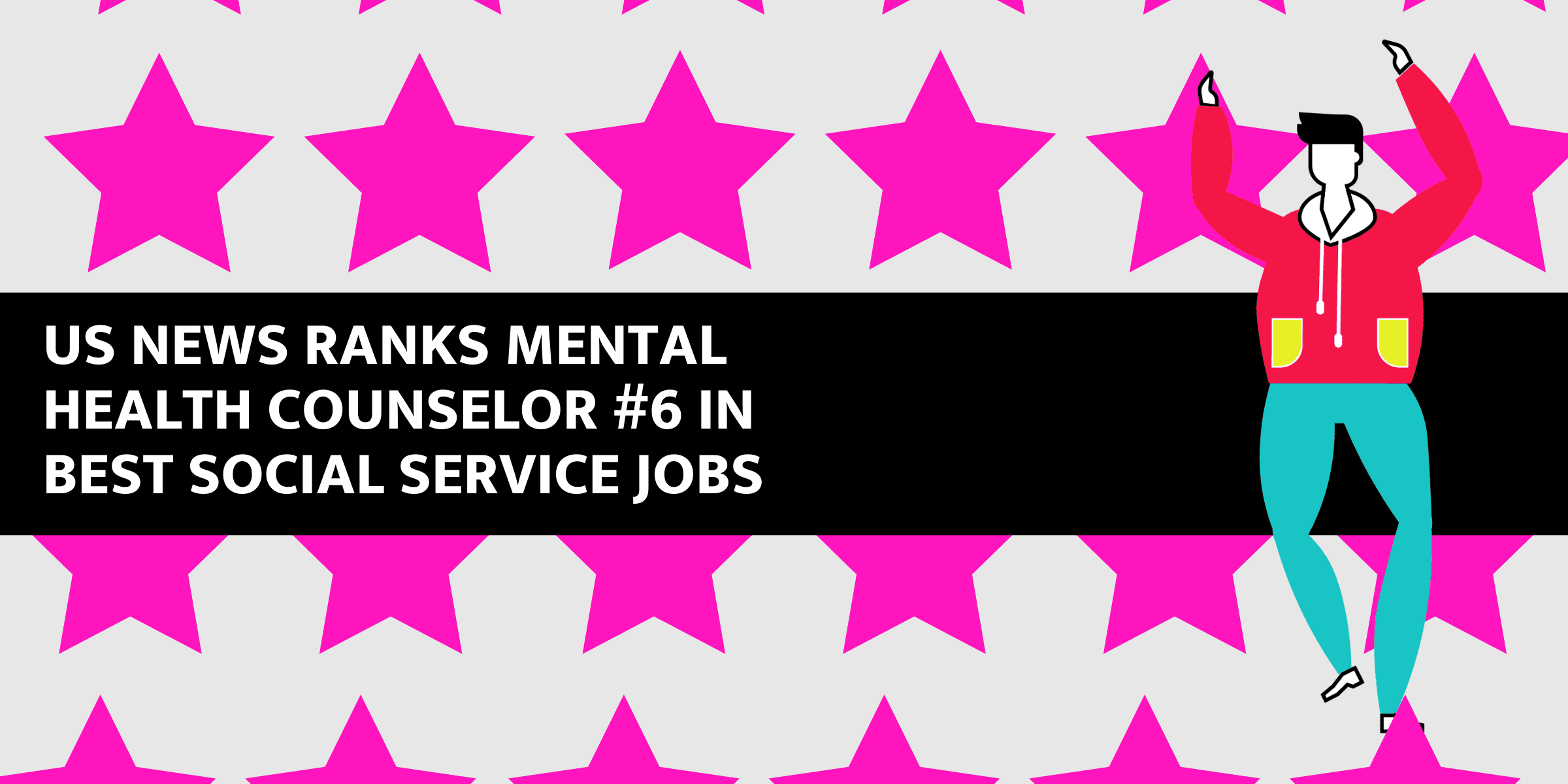
It’s worth noting that there’s also a difference between mental health counseling and psychotherapy, though the terms are frequently used interchangeably. Counseling focuses in on mental health specific issues, such as disordered eating, anger management, or substance addiction. Psychotherapy is a broader approach aimed at improving relationships and quality of life by altering a person’s thinking and behavior. Counseling tends to be time-limited and employ a specific therapeutic framework, while psychotherapy tends to be longer-term and to integrate several modalities.
What Types of Counselors Are There?
Most counselors work as licensed professionals. Licensure is awarded at the state level, and different states have different requirements for education and experience. A few different titles are used to identify professional mental health counselors. The title of LPC is the most common and endorsed by the counseling profession, but several others are frequently used by different states, employers, and credentialing bodies.
- Licensed Professional Counselor (LPC)
- A Licensed Mental Health Practitioner (LMHP)
- Licensed Mental Health Counselor (LMHC)
- A Licensed Clinical Mental Health Counselor (LCMHC)
- Licensed Clinical Professional Counselor (LCPC)
- A Licensed Professional Clinical Counselor of Mental Health (LPCC)
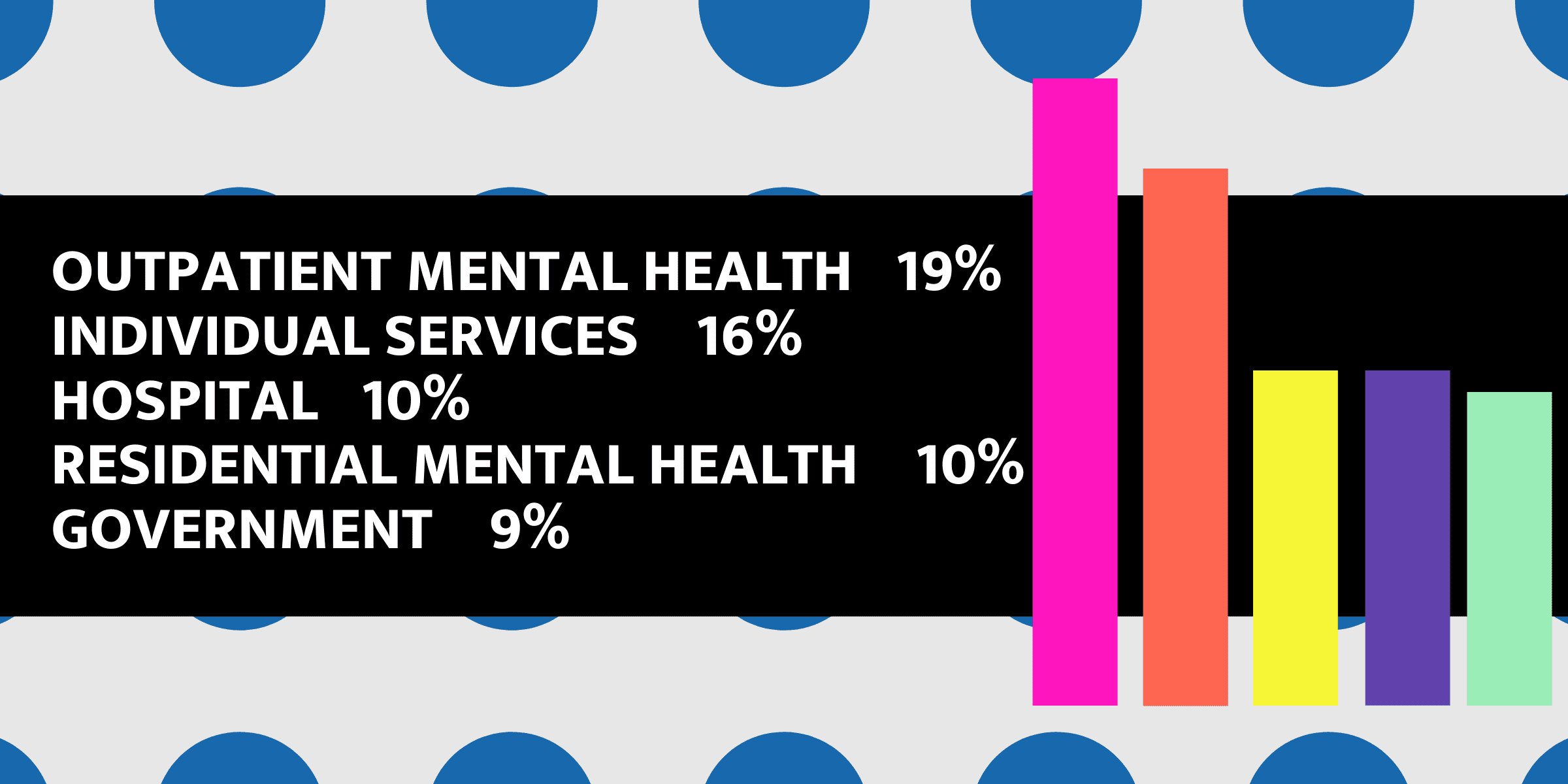
Mental Health Settings
Just as there are several different types of counselors, these mental health professionals can work in a variety of settings, such as:
- inpatient or outpatient mental health centers
- prisons and juvenile detention facilities
- halfway houses
- detox centers
- adoption and foster agencies
- nursing homes
- schools and universities
- veterans’ centers
- employee assistance programs (EAPs)
- private practice
What is a Degree in Counseling?
There is some variance in the type of degree and professional credentials you’ll need to find work as a mental health counselor. Requirements to serve as a counselor vary from state to state, and different jobs also have different minimum requirements. Broadly speaking, you’ll need a master’s degree and state licensure to work as a licensed counselor.
At the bachelor’s level, there are a number of options for your major. You can earn a Bachelor of Arts (B.A.) or a Bachelor of Science (B.S.) degree in such fields as:
- psychology
- education
- sociology
- social work
- counseling
All of the above majors provide a solid background in human behavior, development, social interactions, health, and psychology, as well as applied statistics and biology. These majors also develop skills in research and analysis. Because counseling is mainly a master’s level field, fewer undergraduate degrees in counseling are offered.
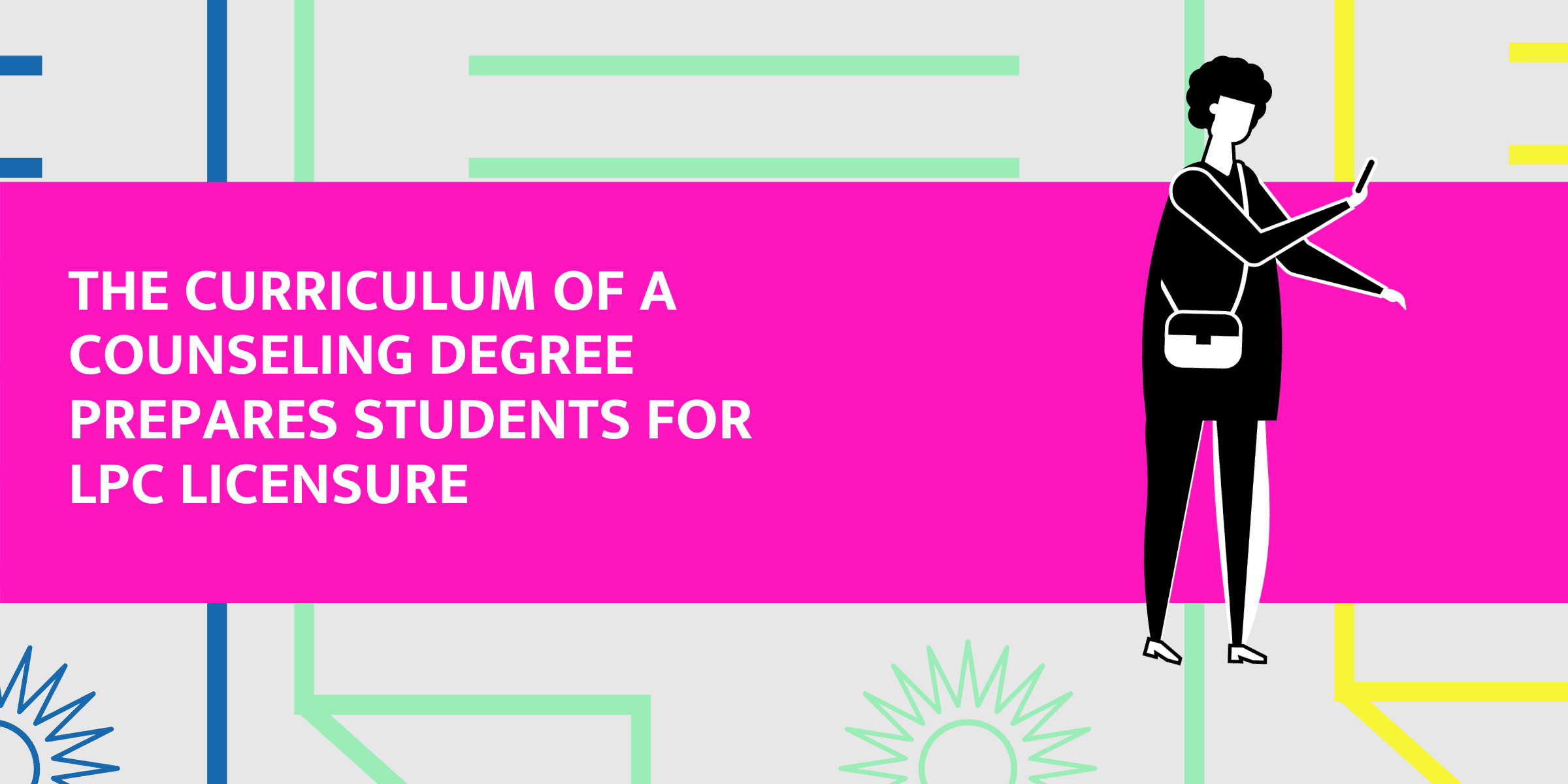
Bachelor’s Degree
If you already know you want to become a counselor, choosing a bachelor’s degree in counseling can help you better prepare for your graduate degree through focused coursework. On the other hand, opting for a bachelor’s degree in a related field like social work can provide you with a broader skillset, which can be helpful later in your career.
Graduates of bachelor’s degree programs may be able to get jobs as substance abuse or outreach counselors, but a graduate degree is required for certification and licensure. Most employers prefer, and many require, these credentials for mental health counseling jobs.
Master’s Degree
A master’s degree in counseling is usually awarded as an M.S. or MPS degree and typically takes two years to complete on a full-time basis. Prospective students should look for a graduate school whose counseling degree program is accredited by the Council for Accreditation of Counseling and Related Educational Programs (CACREP). Other accrediting bodies include the American Psychological Association (APA), the Council on Rehabilitation Education (CORE), and the American Association for Marriage and Family Therapy (AAMFT).
What Classes Will I take for a Degree in Counseling?
Every school has its own individual curriculum for a degree in counseling. In most cases, the curriculum is tailored to prepare students to meet the licensure requirements of their state. This is important to keep in mind if you plan to pursue your counseling degree in a different state from the location where you will be practicing.
A master’s degree in counseling typically includes classes that cover theoretical foundations and hands-on skills. Classes for a master’s degree in counseling may include titles like:
- Strategies for Counseling and Psychotherapy
- Adult/Child Assessment of Counseling
- Group Counseling and Psychotherapy
- Ethics and Legal Issues in Counseling
- Outreach, Prevention & Advocacy
- Human Development
- Cultural Diversity in Counseling
- Psychodynamic Viewpoints
- Psychopathology in Counseling
- Foundations of Family, Marital and Couples Counseling
- Theory & Technique of Substance Abuse
Specializations or Concentrations
Your counseling degree program may offer specializations or concentrations in a particular area of counseling. Some of the counseling specializations offered by graduate schools include career counseling, substance use counseling, family counseling, and child and adolescent counseling.
BEST TYPES OF COUNSELING DEGREES
The work of a professional LMHC is very much hands-on, involving interpersonal work with individuals and groups from all demographics and walks of life. For this reason, experiential learning is a significant part of the curriculum for a degree in counseling. You can expect to learn outside the classroom through a supervised internship or practicum as part of a degree in counseling. You’ll also synthesize your learning by completing a research-based or project-based thesis.
What Counseling Credentials Will I Need?
There are quite a few steps required to become a counselor. All practitioners must be licensed to standardize education and experience requirements and protect mental health consumers. The requirements to become licensed vary by state. If you’re considering pursuing a degree in counseling, you’ll want to familiarize yourself with the counseling licensure requirements in the state where you intend to learn and practice.
The American Counseling Association lists current licensure requirements by state on their website. Almost all states require a master’s degree, fieldwork, and a licensure exam. In addition to the above requirements, some states require additional credentials for school counselors, such as a teaching certificate and sometimes 2-5 years’ teaching experience.
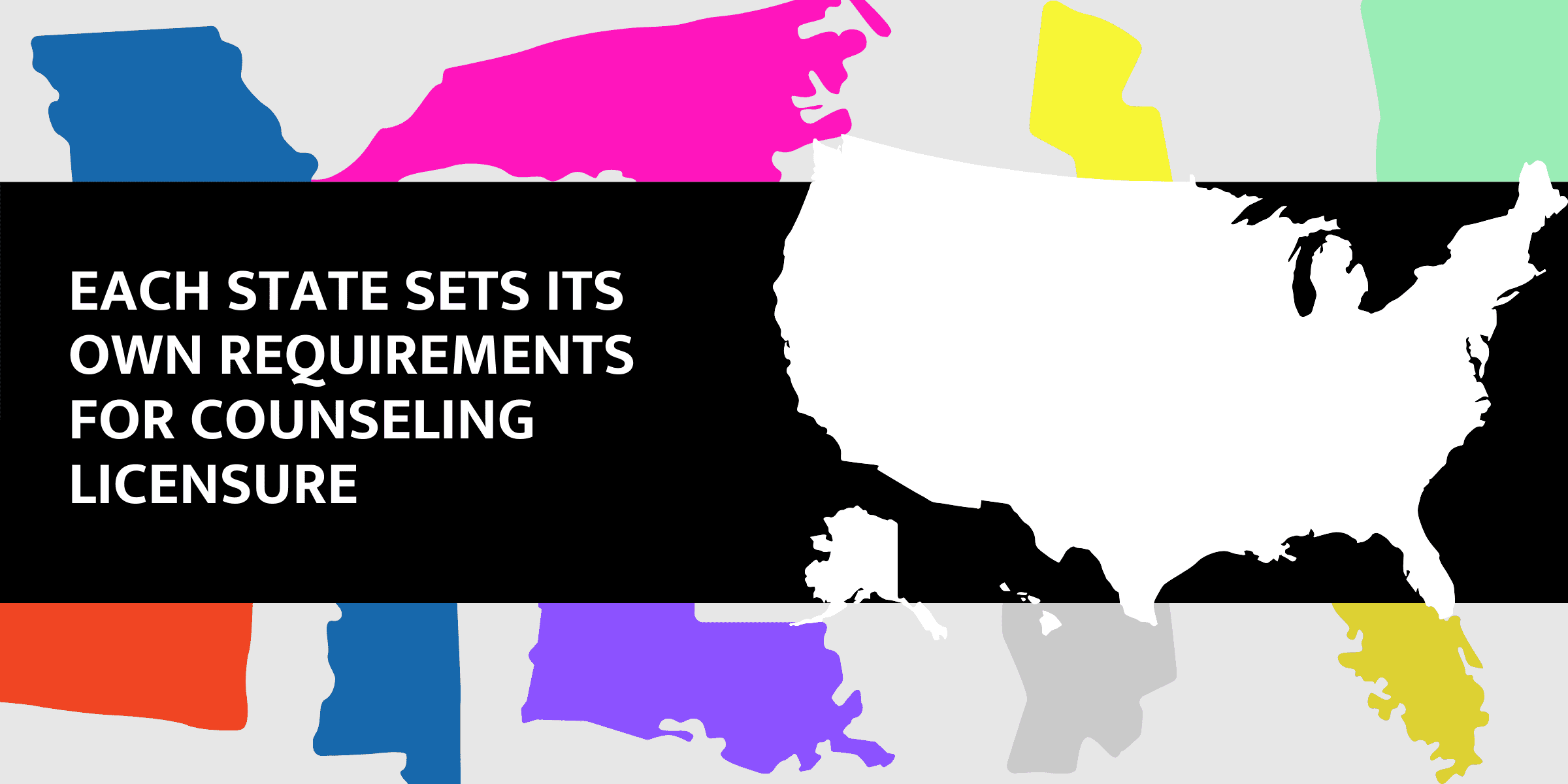
National Certifications
You can obtain general certification through the National Board for Certified Counselors (NBCC) at the national level. To gain NBCC certification as a National Certified Counselor (NCC), you’ll need a master’s degree in counseling from a CACREP-accredited program (or a non-accredited master’s plus two years’ fieldwork), and must pass the NBCC’s National Counselor Examination for Licensure and Certification (NCE). Other national-level credentials offered by the NBCC include Certified Mental Health Counselor (CMHC), Certified Clinical Mental Health Counselor (NACCMHC), and National Certified School Counselor (NCSC)
Once you’ve earned your certification as an NCC, you’ll need to maintain it by completing 100+ hours every five years in approved continuing education credit, or you can opt to re-take and pass the NCE exam again. Your state licensure will also require you to maintain active status through continuing education and renewal, with the standards differing from state to state.
The many educational, experience and competency requirements for counseling reflect counselors’ vital role. Mental health counselors are trusted with a critical, sensitive, specialized healthcare role, and often work with vulnerable populations, such as children, the elderly, and people in recovery. Rigorous training and strict professional standards are enforced to ensure that the individuals who perform this role are thoroughly qualified across the board.
What Jobs Can I Get with a Degree in Counseling?
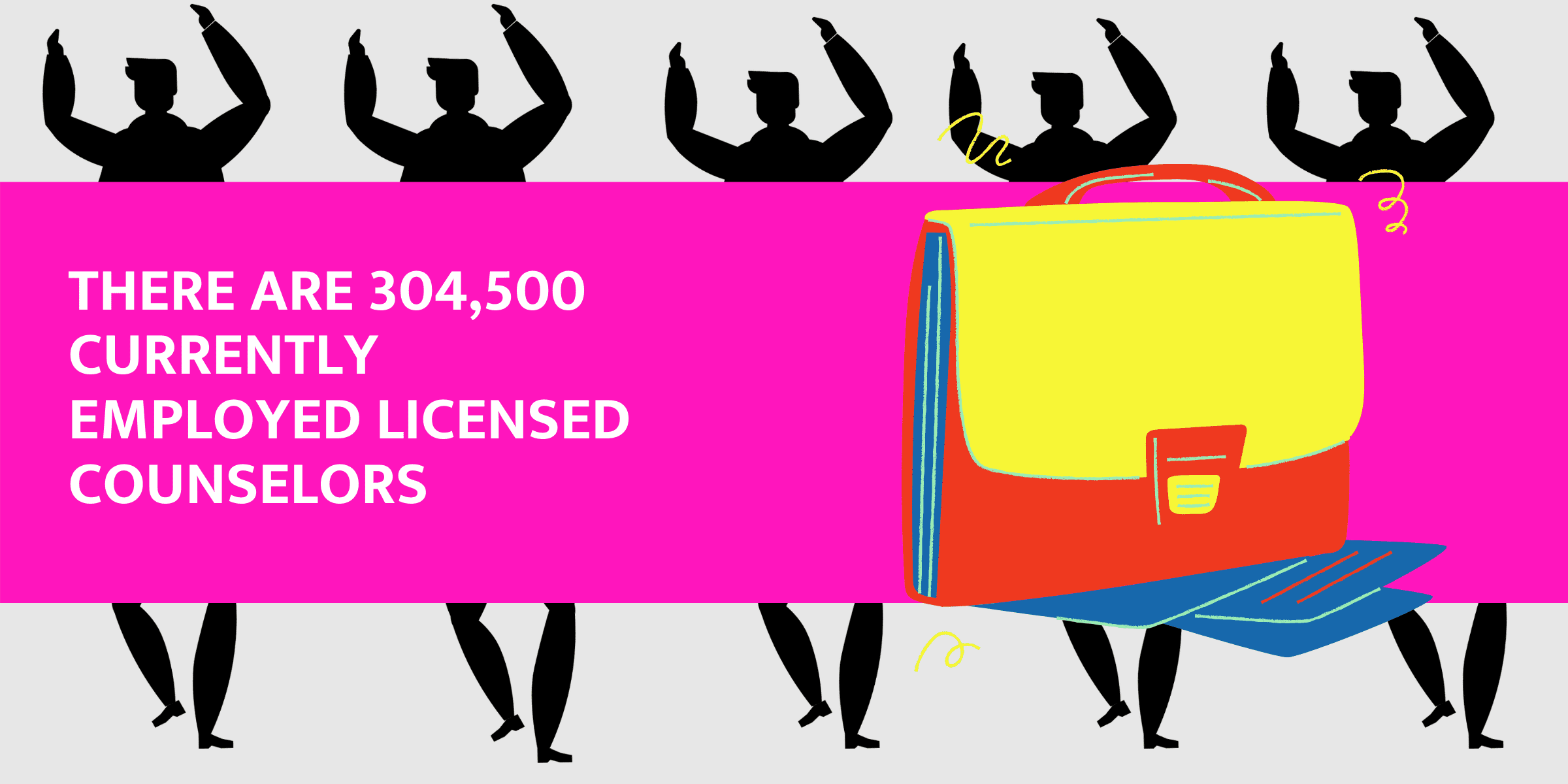
Counseling is an excellent job for those who are competent and compassionate and who thrive on variety. Mental health counselors interact with new people and solve new problems regularly. They can find employment in a wide variety of settings, from the Department of Veteran’s Affairs to rehabilitation centers.
There are also a wide variety of job titles that a counselor can hold. Some of the most common counseling job titles are:
Psychotherapist
Psychotherapists evaluate and treat individuals experiencing psychological and emotional challenges.
Substance use counselor
Substance use or addiction and recovery counselors support individuals with substance use disorder, compulsive gambling, eating disorders, and sex addiction.
Staff Therapist
This catchall term refers to counselors who conduct group candor one-on-one sessions to provide emotional, psychological, or behavioral support. Many new graduates of counseling degree programs work as staff therapists under the supervision of a licensed counselor while pursuing their licensure.
Employee assistance counselor
EAPS support employees and their families on many workplace and personal problems that may affect job performance.
school counseling or Career counselor
Career counselors provide practical and highly personal job-related guidance to college students and adults. Their clients are usually new to the workforce, unemployed, or looking to change careers. any states require specific licensure as a career counselor.
Clinical or program director
Treatment facilities such as rehab clinics, nursing homes, healthcare centers, psychiatric facilities, and group homes need administrators who have clinical backgrounds. Counselors can take on such roles, providing planning, management, and oversight.
What is the Job Market with a Degree in Counseling?
There has never been a better time to pursue a counseling degree and become a counselor. The Bureau of Labor Statistics projects an increase of 22% in the number of jobs for Substance Abuse, Behavioral Disorder, and Mental Health Counselors between 2020 to 2030. This should translate to some 22,300 jobs opening up over the decade. This pace of growth is far above the national average for all jobs.
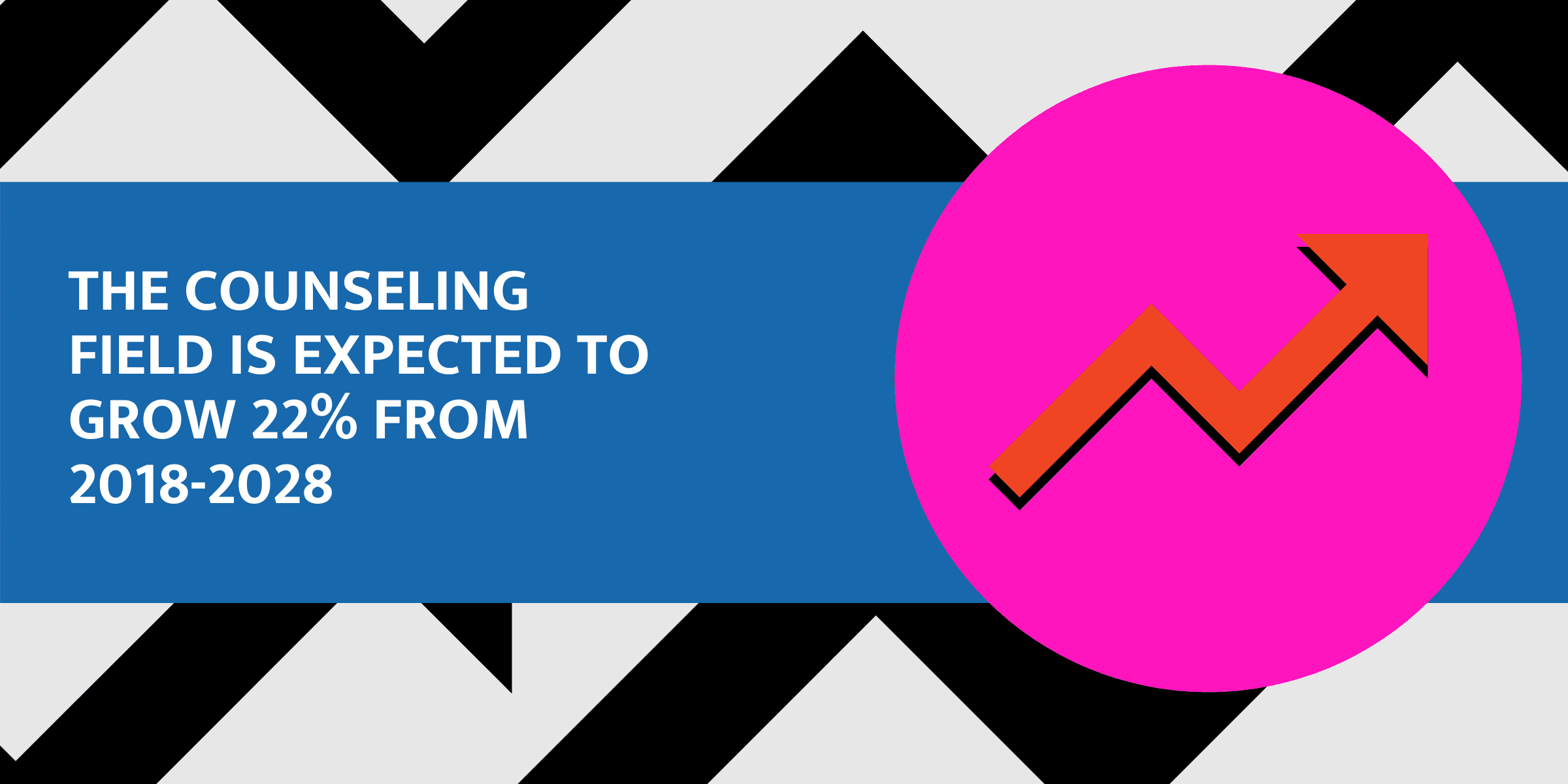
What is driving this growth? Americans are reporting higher rates of depression and anxiety than ever before, probably due to a combination of modern-day stressors and increasing awareness and visibility around mental health issues. Addiction rates, especially opioid abuse, have also risen, urgently demanding qualified treatment professionals to support recovery. Prison reform has also increased judicial preference for treating offenders’ addiction and behavior disorders over jail time when feasible.
Insurance companies are particularly concerned about managing costs around the need for mental health services. Because doctoral-level professionals like psychiatrists and psychologists charge much higher rates for therapy than counselors, insurance companies steer patients towards counselors when possible.
According to the Bureau of Labor Statistics, the average salary for substance abuse, behavioral disorder, and counselors came to $48,250, with the top-paid 10% in the field earning $77,980. Payscale reports that the average salary for a counselor run was $50,467.
What are the Pros and Cons of a Degree in Counseling?
Counseling is a profession, but it’s also a calling. People who pursue a career helping others usually do so for personal and ideological reasons, not material ones. The modest salary is one of the most significant negatives of a counseling career. An average annual income of $44,630 is well above the national average salary.
But according to Georgetown University’s “Economic Value of College Majors” study, the average salary associated with a master’s degree was $78,000. Therefore, people with a counseling degree earn 43% less than the average master’s program graduate. Income from a licensed mental health counselor job will not easily offset the cost of earning a counseling degree and the costs associated with attaining and maintaining counseling licensure.
Counseling is also not an easy job. US News and World Report rated the job of mental health counselor 2/10 for stress, reflecting the highest possible score for job-related stress. The stress associated with counseling challenged populations, often in adverse conditions, is why the Bureau of Labor Statistics cites the high turnover rate for counselors.
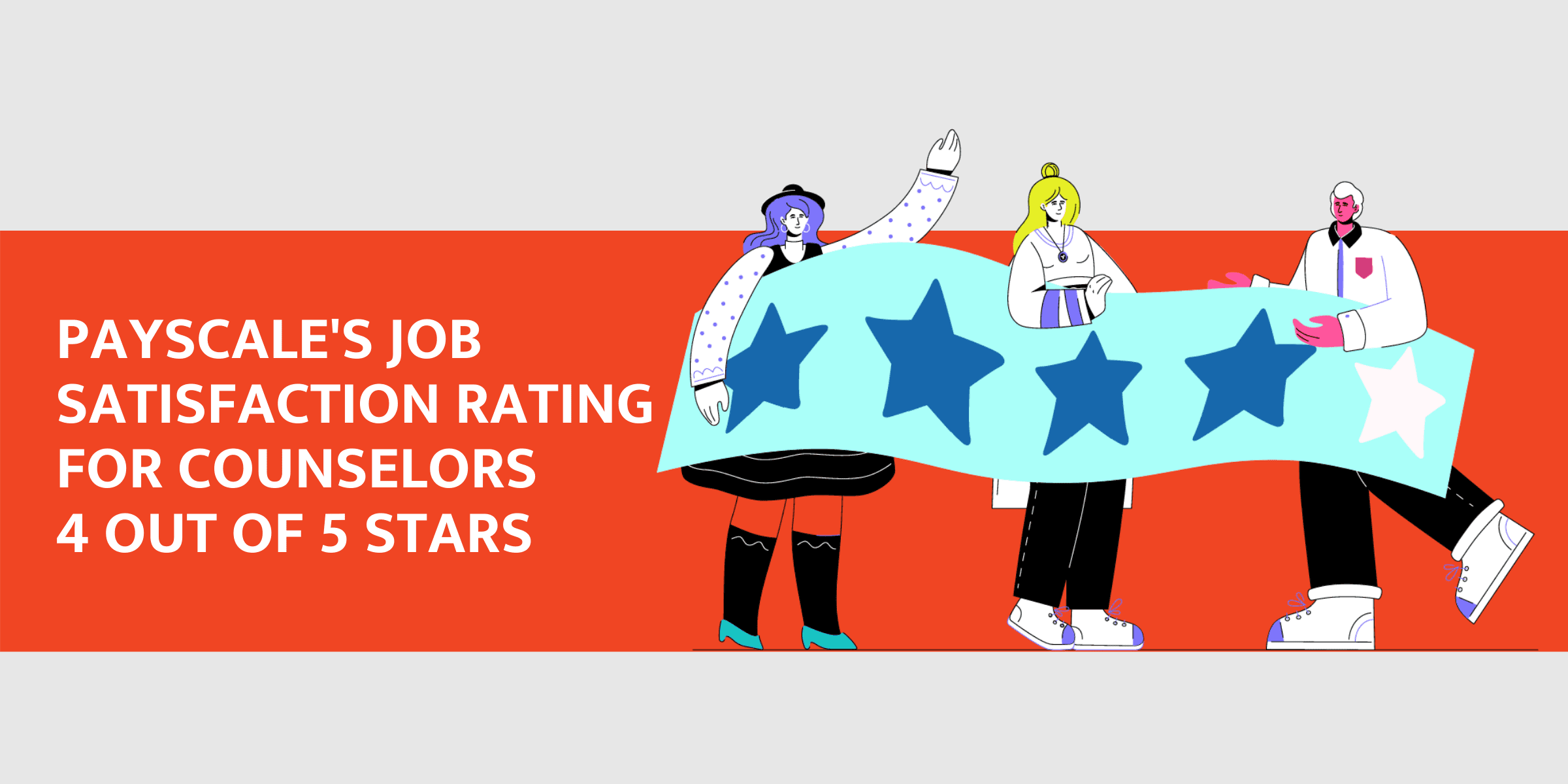
Your Career in Counseling
Counterintuitively, counselors seem to find their difficult jobs rewarding. Surveys have found that counselors award their profession high marks in terms of job satisfaction. A large part of this is the personal satisfaction they feel from personally driving meaningful changes in people’s lives.
By supporting those facing serious life challenges like eating disorders, substance additions, prison sentences, and domestic violence, counselors can even save lives by intervening in crises.
Another essential consideration is work-life balance. Younger workers in particular are more likely to say they prioritize healthy work boundaries and job flexibility. US News and World Report rank counseling above average for work-life balance. The high demand for this role can also mean that it is easier for counselors to move between jobs and thus have greater professional freedom.
Related:
- How Do You Become a Mental Health Counselor?
- What Can You Do With a Master’s in Psychology
- 5 Great Internet Resources for Mental Health Specialists
- 5 Important Mental Health Jobs
- What is a Psychiatrist?
- How Do You Become a Psychiatrist?
- What is the Difference Between a Psychiatrist and a Psychologist?”
- What Can I Do With a Psychiatric Nursing Degree?
- 5 Great Medical Careers with a Master’s Degree
- Top 10 Best Healthcare Careers for the Future
- What is Socio-behavioral Studies in Healthcare?
- 5 Benefits of Didactic Group Therapy
- What Can You Do with a Human Service Degree?
- 5 Top-Paying Psychology Concentrations
- Jobs with a Medical Social Work Degree?
- What Can You Do With a Master’s in Psychology Degree Program?